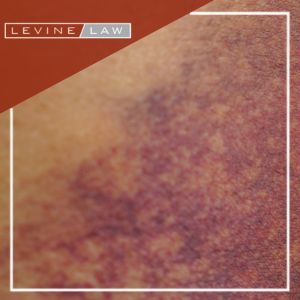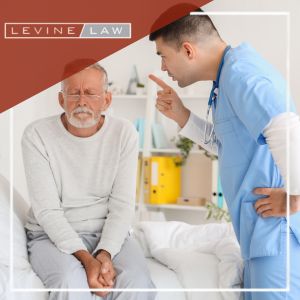Consequences of Nursing Home Abuse
Nursing home abuse can happen to any nursing home resident. It often occurs as a result of overstaffed nursing homes, insufficient background checks and stressed nursing home staff. At Levine Law, we provide experienced legal representation for Denver nursing home residents and their families. Our attorneys and professional staff members are passionate about fighting for victims of neglect and abuse, and our legal team is committed to ensuring that negligent and abusive nursing homes pay for their misdeeds. We understand the dire consequences that can result when senior citizens are abandoned in nursing homes; and, if you or your family is entitled to compensation, we want to make sure you recover the compensation you deserve.
Nursing home staff may:
- Fail to provide proper care to seniors,
- Provide incorrect dosages of medication,
- Medicate a senior unnecessarily to make the senior’s behavior easier to manage
- Actively engage in intentional abuse,
- Commit financial abuse and strip elderly individuals of their possessions and financial security, or
- Conduct physical, verbal or emotional abuse that can cause other injuries.
All nursing homes in Colorado are subject to certain standards and regulations. These include requirements to adhere to residents’ care plans and provide residents with access to professional medical care. When nursing homes abandon their residents, they put their residents at risk for dangerous illnesses and injuries, and they deserve to be held fully accountable for the consequences of their actions.


Find Out How Much Your Case in Worth
Call us for a FREE consultation. No Fee Unless We Get You Money.
Misconduct by Nursing Home Staff

In a nursing home, staff misconduct can take many different forms. As a general rule, staff members should always act with residents’ best interests in mind. If a staff member’s conduct seems questionable, or if you witness clear evidence of neglect or abuse, you should take action promptly in order to prevent any further harm.
Some of the most common examples of staff misconduct in nursing homes include:
- Neglecting residents’ basic needs
- Over-medicating residents or withholding residents’ medications
- Physical abuse of residents (including pushing, grabbing and slapping)
- Preventing residents from contacting friends and family
- Sexual abuse, including harassment, inappropriate touching and sexual assault
- Theft, attempting to exercise undue influence, and other forms of financial fraud
- Withholding access to hygienic needs or medical care
- Yelling or swearing at residents, insulting residents, and other forms of emotional abuse
Our Denver Nursing Home Abuse Lawyers Understand the Effects of Misconduct
The effects of nursing home staff misconduct can be severe; and, in many cases, they can be life-long. Residents who have been mistreated and abused will often suffer from dangerous and chronic medical conditions, and they can experience severe emotional trauma. At Levine Law, we have decades of experience representing nursing home residents and families who have experienced situations very similar to yours. We understand the devastation that neglect and abuse can cause, and we believe strongly in fighting to protect seniors’ legal rights.
If you or a family member has experienced any of the following, we urge you to contact us promptly for a free consultation:
- Dehydration or malnutrition
- Emotional withdrawal
- Hygienic issues
- Medication errors
- Physical injuries
- Other unexplained physical or psychological symptoms
If you or a family member has been mistreated or abused by nursing home staff, our Denver nursing home abuse attorneys can hold the nursing home accountable for your losses. Nursing homes have a legal obligation to protect their residents, and this extends to the selection and supervision of their employees. Whether your nursing home failed to give due consideration to an incident in a staff member’s previous employment or failed to adequately protect against the risk of staff misconduct, we can use the law to make sure you and your loved ones receive the care and compensation you deserve.
Issues Caused By Insufficient Staffing
Like other issues that can cause residents to receive an unacceptable level of care, maintaining insufficient staff is considered negligent under Colorado law. Nursing homes have an obligation to ensure that the seniors they serve have access to adequate care and support; and, when they fail to meet this obligation, the law holds them financially responsible. In most cases, insufficient staffing takes one of two forms:
- Inadequate Number of Staff Members – In some cases, nursing homes simply do not have enough staff members to meet their residents’ needs. This could involve not hiring enough employees, or not ensuring that the home is adequately staffed at all times (i.e. failing to have coverage when a nurse is sick or goes on vacation).
- Inadequately-Trained and Inexperienced Staff – Another form of insufficient staffing involves hiring inadequately trained and inexperienced staff members. All nursing home staff should have the appropriate qualifications to perform their respective job duties, and caregivers, in particular, should be interviewed and screened to ensure that they can provide an appropriate standard of care.
Sometimes, the signs of insufficient staffing will be clear: empty halls and common areas, residents’ calls going unanswered, and a general lack of maintenance and upkeep are all potential signs that a nursing home is understaffed. However, it is not always easy to tell, and this is why it is always important to seek experienced legal representation.
A Denver Nursing Home Abuse Attorney Will Help You Establish Neglect

In Colorado, all nursing homes are required to provide their residents with the quality of care necessary to meet their basic needs. This includes ensuring that residents receive adequate nutrition and hydration, take their medications as prescribed, receive necessary medical treatment, and have the social support structure needed to live happy and fulfilling lives. When nursing homes fail to meet their obligations, this is known as “nursing home neglect.” Nursing home neglect is a violation of residents’ rights, and it is a legal wrong for which financial compensation is available.
In many cases, the consequences of nursing home neglect can be severe. Residents who do not receive adequate care can suffer from malnutrition and dehydration; they can go for extended periods without receiving treatment for illnesses and injuries; and they can suffer from anxiety, depression and other forms of physical and emotional harm. For elderly residents, these consequences can often have additional complications, and this makes it critical for anyone who suspects nursing home neglect to seek help as soon as possible.
Abandonment is a Form of Neglect
Few forms of nursing home and abuse are more troubling than abandonment. We trust nursing homes to provide our aging loved ones with care and fulfillment and learning that a family member has been abandoned in a nursing home can be devastating. In many cases, the consequences of abandonment are severe. Lack of access to nutrition and medications, inability to get out of a wheelchair or out of bed, lack of necessary medical treatment, severe emotional trauma – these are all likely results of nursing home residents facing abandonment
As with many other forms of nursing home neglect and abuse, it is not always easy to know when a resident has been abandoned. Abandonment can mean different things under different circumstances, and able-bodied senior citizens can be abandoned even if they are able to tend to their own basic needs. Examples of circumstances indicating that a nursing home has abandoned can include:
- Medications not being administered as prescribed
- Residents experiencing symptoms of malnutrition or dehydration
- Poor hygiene
- Residents not being able to access common areas
- Injuries consistent with slips and falls and other accidents where support should have been provided
- Bedsores (also known as pressure sores or pressure ulcers), which are avoidable with proper nursing home care
- Emotional withdrawal
Abandonment in a nursing home can be intentional, or it can be a result of understaffing, unqualified staff or other administrative issues. Regardless of the cause, abandonment is never okay, and it is not an issue that should be ignored. If you are concerned about the care an aging loved one is receiving in a Denver nursing home, we urge you to seek help, and we are happy to provide you with a free and confidential consultation.
Our Attorneys Help You Fight for Compensation After Elopement
There are a number of factors that can lead an elderly nursing home resident to elope. The most common factor is dementia. Residents who have been diagnosed with Alzheimer’s disease, Lewy body dementia, Parkinson’s disease and other forms of dementia are among those most likely to elope, as the effects of their diseases can make them susceptible to wandering off. Residents with dementia can forget that they live in a nursing home, they can experience extreme confusion that leads them to walk aimlessly, or they may believe that they need to go to work or run errands from an earlier station in life.
Other factors that can lead to elopement include neglect and abuse. When nursing home residents do not receive the care they need, or when they experience abuse, they may feel that they have little choice but to try to escape their current living environment. Inadequate access to medications and nutrition, physical and sexual abuse and abandonment are all common precursors to elopement.
Whatever the case may be, nursing homes have a responsibility to protect their residents against elopement. They must have appropriate safeguards in place – including adequate staffing and monitoring of building exits – and they must recognize when residents with dementia or other medical conditions are at high risk for elopement. When nursing home staff and administrators realize that a resident has eloped they must undertake prompt and effective efforts to bring the resident to safety as quickly as possible.
Nursing Home Falls Can Have Serious Consequences
Slips and falls in nursing homes are not only common but that they are frequently serious. Foraging nursing home residents, the consequences of suffering injuries in a fall can include chronic pain and permanent disabilities; and, after a fall, obtaining prompt medical treatment can be critical to minimizing the long-term complications.
Sadly, many falls in nursing homes go unreported. Residents may not realize the severity of their injuries, and nursing home staff may attempt to conceal falls in order to protect their jobs and help their facilities avoid liability. However, the law is clear: If a fall is the result of nursing home neglect or abuse, the nursing home deserves to be held accountable with an injury lawsuit. Falls can be avoided with proper care, and nursing homes that fail to provide proper care must take responsibility.
Falls can result in numerous types of internal and external injuries. For elderly nursing home residents, these injuries can often have lasting complications. It is important that residents receive medical attention promptly after falling, and understanding the potentially life-long effects is critical to making sure your family receives just compensation. The effects of slips and falls in nursing homes frequently include:
- Abrasions, bruises and lacerations
- Chronic pain
- Hip and other bone fractures
- Soft tissue injuries
- Spinal cord injuries
- Traumatic brain injuries (TBI)
- Infections and other harmful complications
After a fall, it is important not to rely on your loved one’s nursing home to provide an accurate account of what happened. Unfortunately, nursing homes will frequently misrepresent the reasons for falls – even blaming residents for their own injuries – in order to try to avoid legal responsibility. At Levine Law, your nursing home abuse lawyer can get to the bottom of what happened, and we can make sure your loved one receives the care, treatment and financial compensation he or she deserves.
Our Denver Nursing Home Abuse Attorney Outlines Warning Signs of Neglect and Abuse
According to a study reported by the National Center on Elder Abuse (NCEA), as many as one in 10 seniors will experience some form of neglect or abuse during his or lifetime. Our Denver injury attorneys know that many of these cases of neglect and abuse occur in nursing homes, where the very people we trust to provide compassionate care to our loved ones are the ones who cause them harm. Review these warning signs of negligent or abusive treatment and seek help as soon as possible.
-
Evasiveness from Nursing Home Administrators and Caregivers
If your loved one is receiving proper care, it should not be difficult to obtain information about his or her eating patterns, medication intake, mobility and general state of wellbeing. On the other hand, if a nursing home is to blame for causing your loved one harm, you may find that administrative staff and caregivers are evasive when asked for information about a resident’s condition or care.
-
Pressure Ulcers (or “Bedsores”)
Pressure ulcers (also known as pressure sores and bedsores) are injuries that result from prolonged periods of immobility. They are preventable, and nursing home staff should provide adequate assistance to residents with limited mobility in order to prevent these injuries from occurring.
-
Other Unexplained Injuries
In addition to bedsores, other unexplained injuries will often be indicative of nursing home neglect or abuse as well. This includes injuries consistent with falls and sexual abuse.
-
Unexplained Changes in Mood or Behavior
Elderly nursing home residents who experience neglect and abuse will often exhibit psychological symptoms including anxiety, depression, mood swings, unusually-aggressive behavior and withdrawal. As the family member of someone living in a nursing home, it is important to know how to spot the signs of elder abuse.
-
Unused (or Missing) Medications
Nursing home caregivers should be trained in the proper administration of prescription medications, and they should follow a detailed schedule to ensure that all residents receive their medications as prescribed. If your loved one is not receiving his or her medications, or if pills are disappearing more quickly than they should, these can both be signs of negligence or intentional abuse.
-
Missing Cash, Checkbooks and Credit Cards
In addition to physical and emotional abuse, financial abuse is a major problem in nursing homes as well. If your loved one is missing cash or checks, or if unexplained purchases appear on his or her checking account or credit card statement, these too could be signs of nursing home abuse.
-
Elopement
Elopement – leaving a nursing home without supervision – can be extremely dangerous for aging residents, and it is a problem that nursing homes need to take adequate measures to avoid. While elopement is often a product of dementia, voluntarily eloping is very frequently a sign that a resident has experienced abuse, and in almost all cases it is a product of negligent care.
INJURED? GET THE MONEY YOU DESERVE!
Call Levine Law Today at 303-333-8000 and Get Our Injury Lawyers Fighting for Your Rights.
What to Do When Nursing Home Abuse Occurs
If you or a loved one has suffered nursing home abuse, an experienced attorney can help you hold the nursing home and the abusive staff member legally responsible for any injuries that occurred. You will need to prove that neglect or intentional abuse occurred, and the Denver nursing home abuse lawyers at Levine Law can help you gather the evidence you need. Our legal team has more than 20 years of experience helping injured victims throughout the Denver area get the justice they deserve. We are tough litigators who will make sure the parties who are responsible for the neglect and abuse are held accountable for their actions.


















